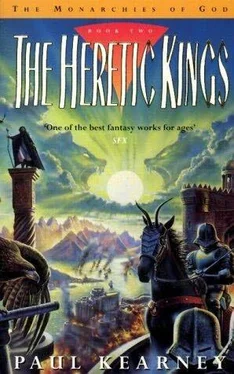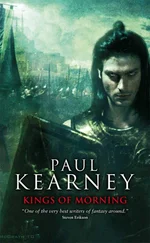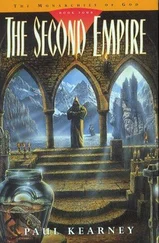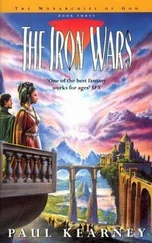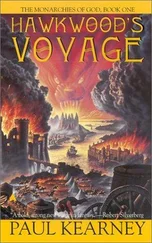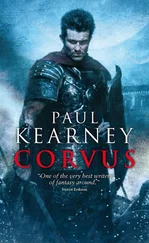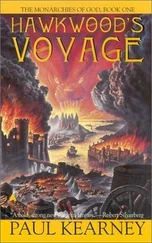Paul Kearney - The Heretic Kings
Здесь есть возможность читать онлайн «Paul Kearney - The Heretic Kings» весь текст электронной книги совершенно бесплатно (целиком полную версию без сокращений). В некоторых случаях можно слушать аудио, скачать через торрент в формате fb2 и присутствует краткое содержание. Жанр: Фэнтези, на английском языке. Описание произведения, (предисловие) а так же отзывы посетителей доступны на портале библиотеки ЛибКат.
- Название:The Heretic Kings
- Автор:
- Жанр:
- Год:неизвестен
- ISBN:нет данных
- Рейтинг книги:3 / 5. Голосов: 1
-
Избранное:Добавить в избранное
- Отзывы:
-
Ваша оценка:
- 60
- 1
- 2
- 3
- 4
- 5
The Heretic Kings: краткое содержание, описание и аннотация
Предлагаем к чтению аннотацию, описание, краткое содержание или предисловие (зависит от того, что написал сам автор книги «The Heretic Kings»). Если вы не нашли необходимую информацию о книге — напишите в комментариях, мы постараемся отыскать её.
The Heretic Kings — читать онлайн бесплатно полную книгу (весь текст) целиком
Ниже представлен текст книги, разбитый по страницам. Система сохранения места последней прочитанной страницы, позволяет с удобством читать онлайн бесплатно книгу «The Heretic Kings», без необходимости каждый раз заново искать на чём Вы остановились. Поставьте закладку, и сможете в любой момент перейти на страницу, на которой закончили чтение.
Интервал:
Закладка:
“Your baggage train?”
“Fifty carts, eight hundred mules. We travel light, sir.”
“And you’re happy with the route?”
Here Barbius allowed himself the merest sliver of a smile. “Through the Narian Hills by way of Tulm, and so to Charibon for the Pontifical blessing. Along the south-eastern shore of the Sea of Tor and down into Torunna by way of the Torrin Gap.”
“And another Pontifical blessing from the other Pontiff,” Kyriel added, his eyes dancing.
“You’ve been briefed on your behaviour and that of your men?” Briscus said, serious now.
“Yes, sir. We are to be as respectful as possible to the Pontiff and the Church authorities, but we are not to be deflected from our line of march.”
“There is nothing on that line which has the remotest chance of stopping a Fimbrian grand tercio,” Briscus said, his eye narrowing. “But you are to avoid the slightest friction with anyone, especially Almarkans. That is clear, Marshal? You are a nameless functionary; you are obeying orders. All complaints, protests and similar are to be directed to Fimbir, and you are not to delay your march for anything.”
“Of course, sir.”
“Let them think you are a mindless soldier whose job is to do as he is told. If you pause to argue with them just once, then they will wrap you up in coils of Inceptine law and hamstring you. This army must get through, Marshal.”
Barbius looked the Elector in the eye for the first time. “I know, sir.”
“Very well. Good luck. You are dismissed.”
Barbius slapped a forearm against his cuirass and left them. Kyriel watched him go, pulling at his lower lip with one restless hand.
“We are walking a rope here, Briscus.”
“Don’t I know it. Himerius must accept that we are going to help Torunna, heretic king or no; but we cannot afford to alienate him completely.”
“I see what you mean, about soldiers and politicians.”
“Yes. We live in a complicated world, Kyriel, but of late it’s become even more interesting than it was before.”
TWO
The King was gone, and there were those who said that he would never be coming back.
Abrusio.
Capital of the Kingdom of Hebrion, greatest port of the western world-indeed, some would say of the entire world. Only ancient Nalbeni might vie with Abrusio for the title.
For centuries the Royal House of the Hibrusids had ruled in Hebrion and their palace had frowned down over the raucous old port. There had of course been dynastic squabbles, internecine warfare, obscure marital entanglements; but in all that time the Royal house had never relaxed its grip on the throne.
Things had changed.
Winter had come to the west, propelled on the wings of war. The armies that battled on the eastern frontiers of the continent had withdrawn to their winter quarters and it seemed that the ships which plied the western seas had followed their example. The trade lanes of nations grew emptier as the waning year grew colder.
In Abrusio the Great Harbour, the Inner and Outer Roads as the other harbours were named, the sea itself, were whipped into a broken swell of tumultuous waves, white-tops gilding their tips. A steady roar of surf pounded the huge man-made moles that sheltered the harbours from the worst of the winter storms, and the beacon towers were lit along their length, gleaming flames battling the wind to warn approaching ships of the shallows and mark the harbour entrances.
The wind had backed as it freshened; the season for the Hebrian Trade had long ended, and now it howled in from the south-west, shoving Hebrion-bound vessels landwards and making the teeth of ship-masters grate as they fought to avoid that worst nightmare of any mariner, a lee shore.
Abrusio was not at its best at this time of year. It was not a city that relished winter. It housed too many pavement taverns, open-air markets and the like. It was a place which needed sunshine. In the summer its inhabitants might curse the unwavering heat that set the buildings shimmering and brought almost to an art form the stink of the sewers and tanneries, but the city was more alive, more crowded-like a termite-mound with a broken shell. In winter it closed in on itself; the harbours saw only a tithe of the trade they were accustomed to, and the waterside inns and brothels and ships suffered as a result. In winter the city tightened its belt, turned its face from the sea and grumbled to itself, awaiting spring.
A spring without a king, perhaps. For months King Abeleyn of Hebrion had been absent from his capital, away at the Conclave of Kings in Perigraine. In his absence the new High Pontiff of the west, Himerius-one-time Prelate of Hebrion-had ordered an army of the Church’s secular arm, the Knights Militant, into Abrusio to check the rising tide of sorcery and heresy in the old city. The King no longer ruled in Hebrion. Some said he would pick up the reins as soon as he returned from his travels. Others said that when the Church manages to worm its way into the chambers of government, it is not so easy to eject it.
Sastro di Carrera let the wind water his eyes and stood with his doublet billowing about him on the wide balcony. A tall man, his black beard oiled to a curling point and a ruby the size of a caper set in one ear, he had the hands of a lutist and the easy carriage of one accustomed to having his own way. And that was only natural, for he was the head of one of the great houses of Hebrion and, at present, one of the de facto rulers of the kingdom.
He stared out and down across the city. Below were the prosperous quarters of the merchants and the lesser nobility, the halls of some of the more prestigious guilds, the gardens of the rich denizens of the Upper City. Farther down the hills, the teeming slums and tenements of the poorer, low-born people; thousands of ochre-tiled roofs with hardly a gap between them. A sea of humble dwellings that bloomed out in the drizzle and wind of the day down to the harbours and the waterfronts, what some called the bowels of Hebrion. He could pick out the looming, stone-built massiveness of the arsenals and barracks in the western arm of the Lower City. Down there were the sinews of war, the culverins and powder and laid-up arquebuses and swords of the Crown. And the men: the soldiers who comprised the Hebrian tercios, some eight thousand of them. The mailed fist of Abrusio.
Looking farther out still, he fixed his gaze where the city ended in a maze of quays and jetties and warehouses, and a huge tangled forest of masts. Three enormous harbours crammed with miles of ship berths, an uncountable myriad of vessels from every port and kingdom in the known world. The bloodstream of trade, which kept Abrusio’s leathery old heart beating.
And there, over half a league away, Admiral’s Tower with its scarlet pennant snaking and snapping in the wind, hardly to be seen but for the glint of gold upon it. In the state shipyards rested galleys, galleasses, caravels and war-carracks by the hundred. The fleet of the most powerful seafaring nation west of the Cimbric Mountains. There, that was what power looked like. It was a gleam of iron on the barrel of a cannon; the glitter of steel at the head of a lance. It was the oak of a warship’s hull. These things were not the trappings, but the essence of power, and those who thought themselves in positions of authority often forgot that, to their lasting regret. Power in this day and age was in the muzzle of a gun.
“Sastro, for the Saint’s sake close the screen, will you? We’ll perish in here of the cold before we’re done.”
The tall nobleman smiled out at the wintry metropolis, cast his glance left, to the east, and he saw there something to brighten the dullness of the day. On a cleared patch of ground near the summit of the city, perhaps some four acres in extent, was what appeared to be a conflagration, a carpet of fire which lit up the afternoon. On closer inspection it might be seen that the inferno was not one single blaze, but a huge number of lesser bonfires grouped closely together. They were silent; the wind carried the hungry roar of the flames away from him. But he could just make out the dark stick-figure at the heart of every tiny, discrete fire. Every one a heretic, yielding up his spirit in a saffron halo of unimaginable agony. Over six hundred of them.
Читать дальшеИнтервал:
Закладка:
Похожие книги на «The Heretic Kings»
Представляем Вашему вниманию похожие книги на «The Heretic Kings» списком для выбора. Мы отобрали схожую по названию и смыслу литературу в надежде предоставить читателям больше вариантов отыскать новые, интересные, ещё непрочитанные произведения.
Обсуждение, отзывы о книге «The Heretic Kings» и просто собственные мнения читателей. Оставьте ваши комментарии, напишите, что Вы думаете о произведении, его смысле или главных героях. Укажите что конкретно понравилось, а что нет, и почему Вы так считаете.
